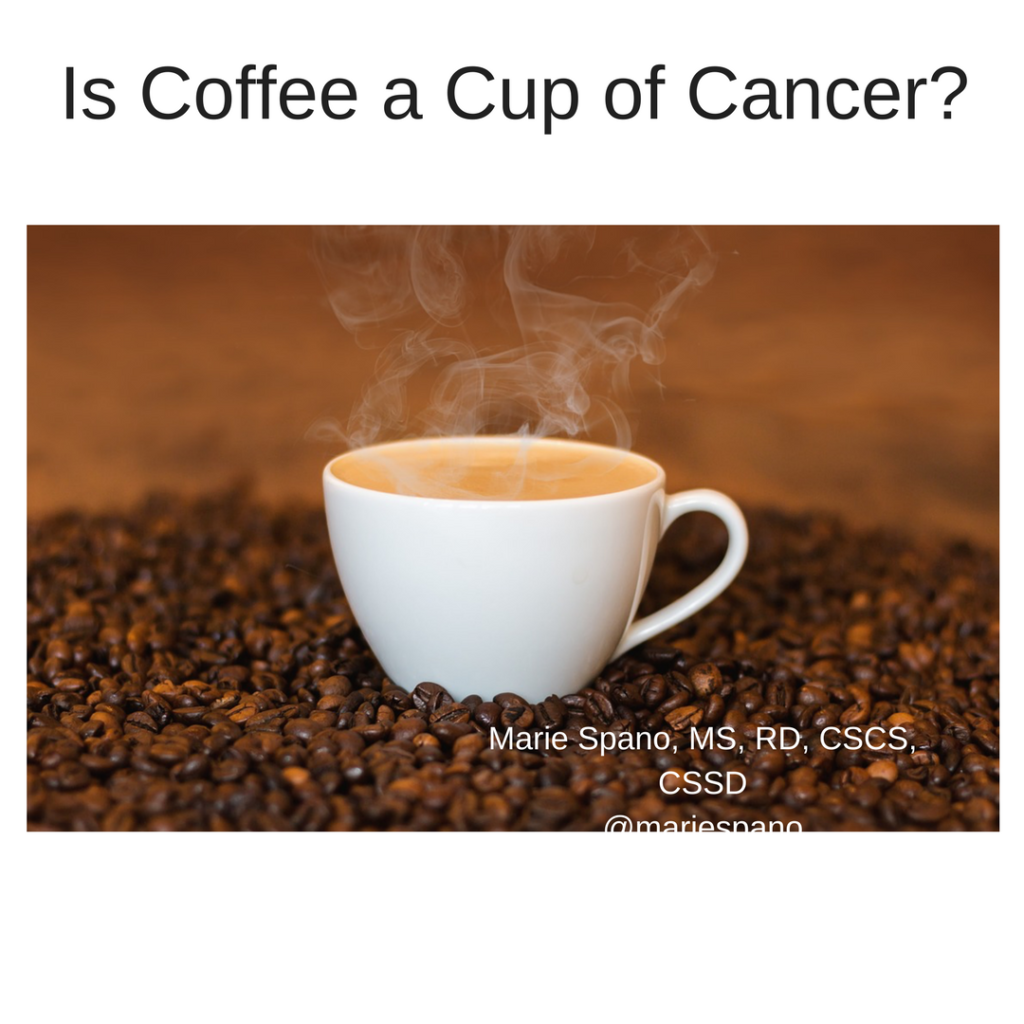Brace yourself. Thanks to a court in California, your cup of coffee may soon come with a cancer warning. The potentially cancer-causing culprit in coffee is acrylamide. Though the court decision is not final yet, the news articles are both confusing and misleading. Acrylamide is far from unique to coffee. Plus, there are no convincing research studies that clearly show acrylamide causes cancer in humans.
Acrylamide and Cancer
The Food and Drug Administration considers acrylamide a health concern. The World Health Organization says acrylamide has the potential to cause cancer to humans. This does not mean it will cause cancer. Cancer is complex. Plus, in research studies, animals were given 1,000 to 10,000 times more acrylamide than the average person consumes each day! No studies to date show a clear increased risk of cancer in humans due to acrylamide. However, these studies have many limits including self-reported food intake (relying on people to remember how often they eat certain foods). According to the American Cancer Society, more studies are needed to evaluate how this compound is formed, how to decrease it and determine potential health risks.
Making matters more confusing, every person metabolizes acrylamide differently. Plus, animals and humans differ as well.
Sources of Acrylamide in Our Diet
Acrylamide forms during high heat cooking including frying, roasting and baking. Boiling and steaming do not typically form acrylamide. Grains and coffee are the foods & beverages that contain higher amounts of this compound. Dairy, meat and fish aren’t a concern. French fries and potato chips are the foods with the highest levels of acrylamide. From chip to chip or French fry to French fry the amount varies depending on how the food is cooked.
Blue Mesa Grill Sweet potato chips contain 16 times the amount of acrylamide as a single cup of Maxwell House original signature blend. Enjoy Rippin’ Good Ginger snap cookies and you’ll consume almost 4 times the amount of acrylamide compared to that cup of coffee from Maxwell House. Though cold brewing sounds like a solution, roasting coffee beans leads to acrylamide, not brewing at home. Smoking and exposure to secondhand smoke are also routes to acrylamide intake. People who work in certain industries including construction, oil drilling, textiles, cosmetics food processing, mining, plastics and more may also be exposed to this compound.
For a list of acrylamide levels is in various foods click here.
Decreasing Your Exposure
Though there are a lot of unknowns and no studies to date that clearly indicate acrylamide contributes to or causes cancer, it makes sense to decrease exposure when possible and when it doing so doesn’t interfere with your enjoyment of food. Here’s how:
- Eat a diet that emphasizes vegetables, fruits, lean meats, poultry, fish, beans, eggs, nuts and dairy.
- Quit smoking and avoid secondhand smoke.
Limit fried foods. - Boil or steam instead of baking and frying when possible.
- Soak potato slices in water for 15 to 30 minutes (drain, blot dry with a paper towel) before baking them.
- Cook your baked goods for a shorter period of time. Don’t burn your bread in the toaster, pull it out when it is light brown. Also, don’t char foods on the grill.
Learn more about other compounds formed during high heat cooking by clicking here.
References:
href=”http://monographs.iarc.fr/ENG/Classification/”>http://monographs.iarc.fr/ENG/Classification/
FDA CFSAN
American Cancer Society
Curr Drug Metab. 2016;17(4):317-26.
